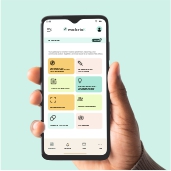Health Facility Support
Health Facility Support
The Health Facility Support program within MalariaX strengthens the frontlines of malaria control by providing health workers and clinics with the tools, data, and guidance they need to deliver effective care. While community reporting and environmental action are vital, the health facility remains the central point for diagnosis, treatment, and follow-up. Supporting these facilities ensures that malaria cases are managed accurately and efficiently, improving outcomes for patients and strengthening national malaria strategies.
One of the core functions of the program is improving data accuracy. Health facilities often struggle with delayed, incomplete, or paper-based records. Through MalariaX, health workers can input case details directly into a digital system, ensuring that real-time information reaches program managers. This allows health authorities to track case numbers more easily, understand regional trends, and detect clusters of infections early. Accurate data improves planning, resource allocation, and the overall response to malaria.
The program also supports clinical workflow by making it easier for health workers to document symptoms, treatments, and outcomes. Digital case management tools reduce time spent on manual paperwork and help ensure no patient information is misplaced. With structured templates, health workers can record data consistently, which improves both clinical decision-making and reporting quality. These tools also support patient follow-up by allowing health facilities to monitor whether individuals return for check-ups or additional treatment.
Training is a crucial part of Health Facility Support. MalariaX provides guides and resources that help health workers stay updated on best practices, recommended treatments, case classification, and reporting procedures. This strengthens the capacity of healthcare staff, especially in remote or resource-limited settings. When health workers are well-trained and well-equipped, patient care becomes more effective and efficient.
The program also enhances communication between facilities and community networks. When health workers receive real-time case reports from households or volunteers, they can prepare for patient arrivals, initiate rapid testing, or dispatch outreach teams. This integration reduces delays and helps ensure that vulnerable individuals receive timely attention. The ability to connect community reports with clinical services strengthens the entire care pathway.
Another benefit of the program is improved coordination between local facilities and national health authorities. Real-time dashboards allow health officials to see which facilities are experiencing higher case loads, where medication shortages may occur, and which areas need additional support. This visibility improves supply chain management, staffing decisions, and resource distribution.
Health Facility Support ensures that the fight against malaria remains grounded in strong, well-equipped clinical systems. By improving data flow, supporting health workers, and enhancing coordination, the program brings structure and efficiency to malaria treatment. It also forms a critical link between communities and national malaria efforts, ensuring that every reported case leads to appropriate, timely care.

 Our Programs
Our Programs
